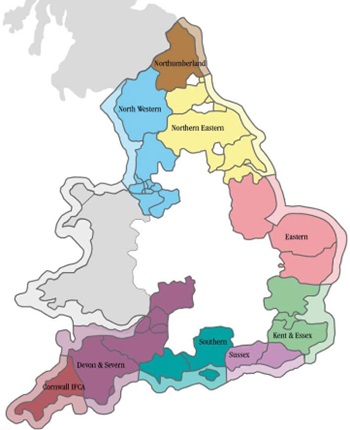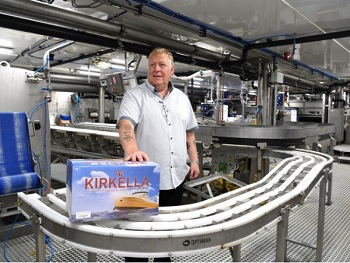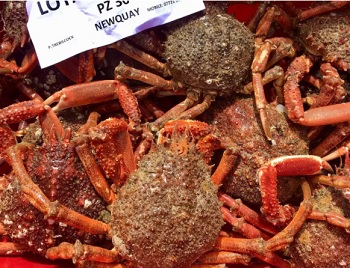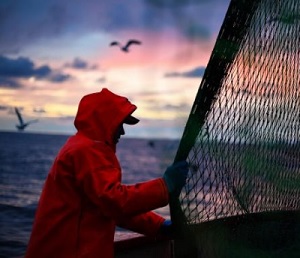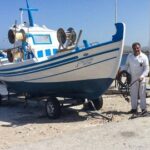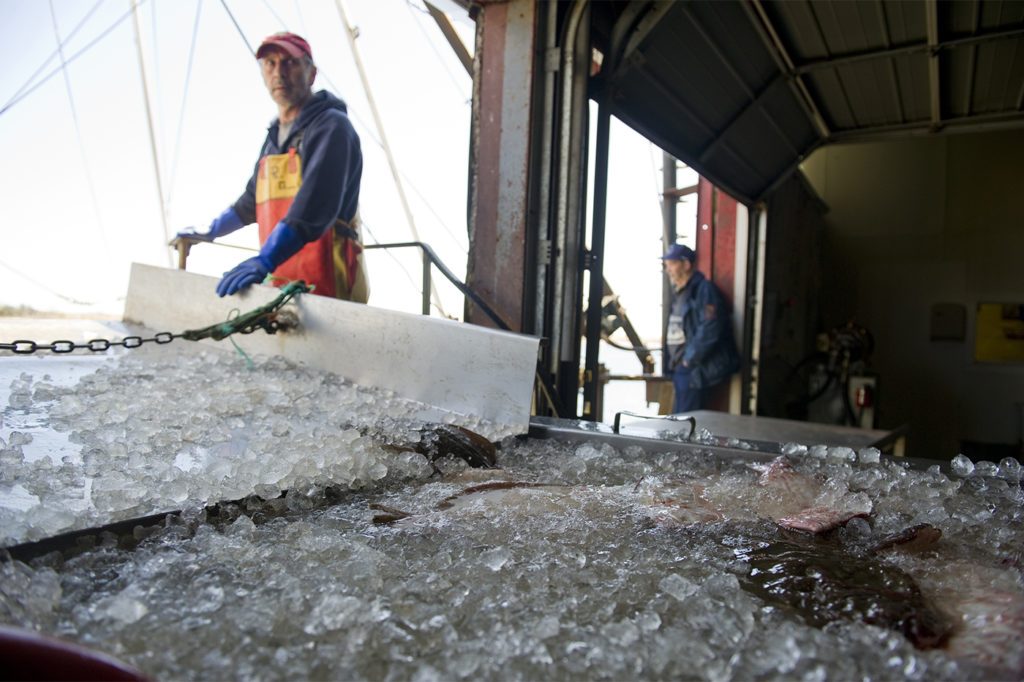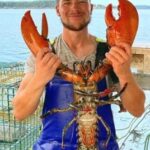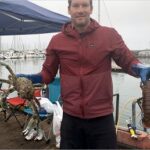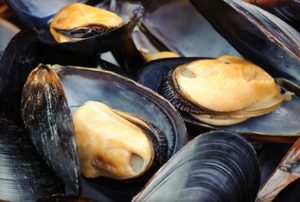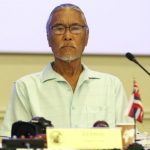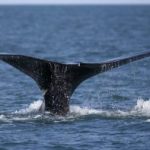Tag Archives: Post-Brexit
European fishermen furious as Britain ‘breaks Brexit deal’ to block them
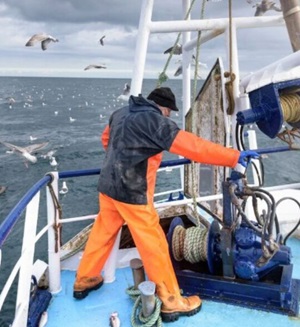 The EU is facing pressure from Denmark and Sweden to take action against the UK in the latest dispute over fishing post-Brexit. The UK has banned catching sand eels on Dogger Bank in the North Sea – a move which could lead Denmark’s fishing industry facing a potential annual loss of €18million (£15.4million). The sand eel is crucial for the economies of both Denmark and Sweden for their uses in pig feed and fish oil. Discussions over how the EU should respond have even included imposing tariffs on UK exports if the dispute escalates to a breach of the on Dogger Bank. Other coastal states are also understood to have backed the demand by Copenhagen for the EU to stand up to London. More, >>click to read<< 16:37
The EU is facing pressure from Denmark and Sweden to take action against the UK in the latest dispute over fishing post-Brexit. The UK has banned catching sand eels on Dogger Bank in the North Sea – a move which could lead Denmark’s fishing industry facing a potential annual loss of €18million (£15.4million). The sand eel is crucial for the economies of both Denmark and Sweden for their uses in pig feed and fish oil. Discussions over how the EU should respond have even included imposing tariffs on UK exports if the dispute escalates to a breach of the on Dogger Bank. Other coastal states are also understood to have backed the demand by Copenhagen for the EU to stand up to London. More, >>click to read<< 16:37
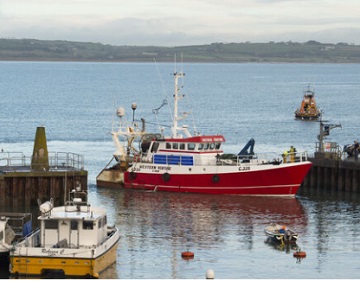
Norway ‘secure more out of fishing deal than Ireland’
Under the deal, Norwegian fishers can catch 224,000 metric tonnes of blue whiting in Irish waters this year, an increase of 110,000 metric tonnes on how much they were allowed to catch last year. In contrast, Irish fishermen and women are only allowed to catch 52,000 metric tonnes of blue whiting, up from the 28,000 tonnes they could catch last year. While unhappy with the lack of quota parity between the two countries, fishing representatives here say the deal has an upside to it. >click to read< 11:50
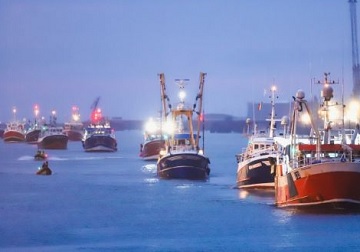
Ireland’s fishing industry: A post-Brexit quandary
Fishermen and women are in a quandary over sharp Brexit cuts to their catch in the EU-UK trade agreement. The deal eliminates some €20 million from mackerel and prawn quotas this year. By 2026 the annual value of all stocks will drop €43 million, a 15 per cent cut from 2020. For the fishing industry, this is the opposite of the decisive European solidarity that buttressed Ireland’s efforts to keep the Border open after Brexit. Trawlers sailed into Dublin port last week to protest outside a meeting of the Dáil in the convention centre. After huge price cuts because of coronavirus, the mood is grim in coastal communities. The Seafood Task Force, a Government-appointed group that includes the industry, reports a “deep sense of grievance”. >click to read< 13:35
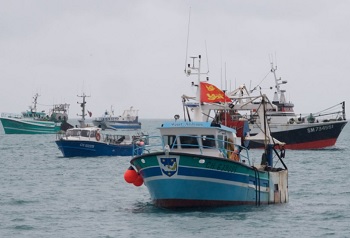
French and Jersey fishermen must talk
STOP – arrêt! It is time for the Jersey and French fishermen to sort out their problems for themselves. It is no use their relying on the parliamentary dignities of Paris and London, nor the statesmen of Jersey or Normandie – they do not understand your problems because they are not fishermen. For the past 20 or so years you have fished together under the agreement of the Bay of Granville. You worked this out together and you can do it again. >click to read< 14:17 From Denise Waller
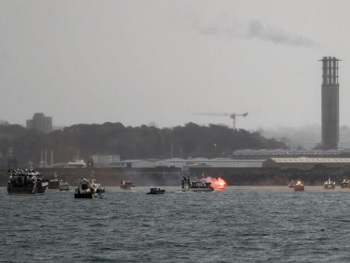
“It’s a peaceful protest,,, Why are French fishermen angry about Jersey’s post-Brexit fishing licences?!!
The issue is over fishing licences post-Brexit. Jersey is a British crown dependency, but it’s only 19km off the coast of France and around 250 French boats regularly fish the waters around the island, supporting around 900 families and another 2,000 jobs on shore. As part of Brexit related fishing talks it was agreed that French boats which had habitually fished around Jersey would be allowed to continue doing so, but would need new licences. Because of Jersey’s unusual status, owned by the British Crown but not actually part of the UK, these licences come from Jersey authorities, not the British government in London. But the fishermen say that when they received their licenses they had new requirements and limitations,,, >click to read< 11:29
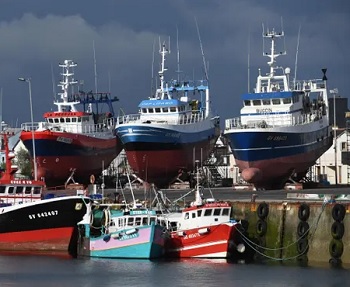
France threatens to cut off the power to Jersey as leverage point in fishing rights dispute over UK water access
Responding to questions in the national assembly, Annick Girardin, the minister for maritime affairs, said she was “revolted” by the UK government’s behaviour over its waters and France was ready to retaliate. The British crown dependency of Jersey, the largest of the Channel Islands, relies on “the transmission of electricity by underwater cable”, Girardin said as she was questioned by assembly members, raising the supply as a point of leverage. “I would regret it if we were to get there,” the minister said, but “we will do so if we have to.” >click to read< 22:44
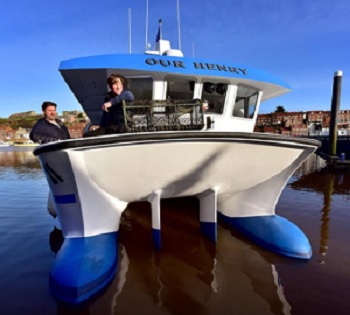
New Whitby lobster boat launches on choppy post-Brexit waters
“Our Henry” is owned by business partners Terry Pearson and Luke Russell. Mr Pearson is the merchant for the local shellfishing fleet, while Mr Russell will skipper the catamaran, the first new boat to join the Whitby fleet for a decade, along with two other crew and a trainee. Delivered a couple of weeks ago the potter has been undergoing sea trials, but should make its first fishing trip later this week. “Then with Covid, the build was delayed, and it has only just arrived when we are in the middle of the winter fishery, “Then of course there has been Brexit,,, >click to read< 16:31
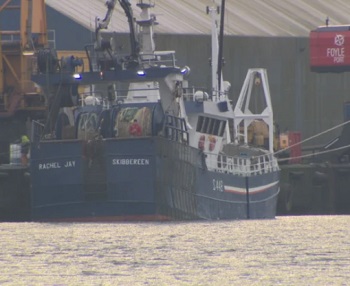
‘We experienced a hard border’ – post Brexit fishing tensions surface
A fishing vessel from the deep south arrived to unload its catch in a port at the other end of the island this weekend. According to representatives of Northern Ireland’s fishing sector, the example of the Rachel Jay from Skibbereen, Co Cork, arriving into Lisahally, Co Derry, is an example of “where there is a will, there is a way” response to Brexit. And they are calling for the Irish Government to reciprocate the gesture. >click to read< 09:15
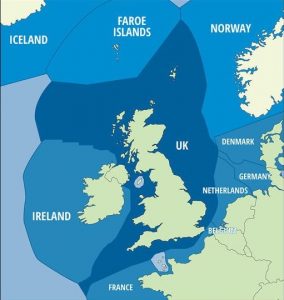
As both sides crank up the rhetoric, UK to outline post-Brexit trade vision. France warns both sides could ‘rip each other apart’
The UK is expected to contest the bloc’s demands that Britain stick closely to EU rules in exchange for access to European markets. It comes as France has warned that the two parties risk tearing themselves apart during the talks,, On Sunday the French Foreign Minister Jean-Yves Le Drian used strong language while predicting that tense negotiations lie ahead.,, The EU wants to keep access to British waters for European fishing boats, and leaders have suggested the issue will be linked to other matters such as financial services in the upcoming talks. >click to read< 08:46
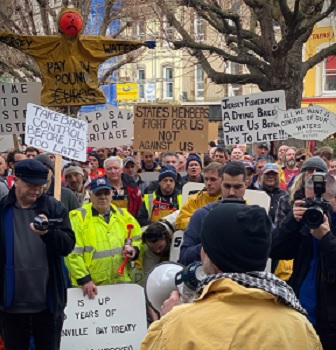
Fishing protest in Royal Square – Unite and Keep Fighting!
More than a hundred fishermen marched in protest yesterday to the Royal Square, where they were promised ‘political intervention’ to overhaul a historic fishing treaty to allow the Island to take back control of its territorial waters. Many clad in their oilskins and dry-suits, they said they feared for their livelihoods as an increasing number of French boats competed with Jersey vessels for depleting stocks of brown crab and lobster. Sirens and air horns sounded in the Royal Square, where Environment Minister John Young vowed that action would be taken. >click to read< 17:51
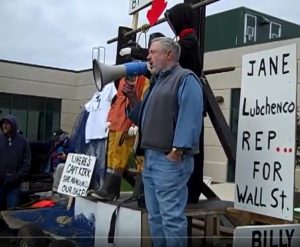 From Gloucester NMFS protest, 2009, Fishermen Unite and Keep Fighting – >click to watch<
From Gloucester NMFS protest, 2009, Fishermen Unite and Keep Fighting – >click to watch<
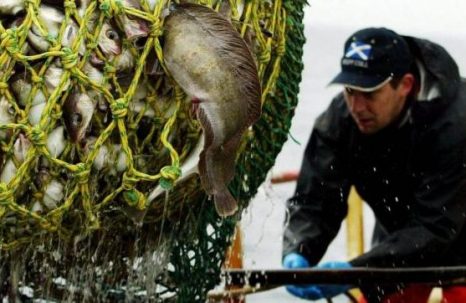
Minister calls for clarity on post-Brexit fishing industry ahead of crunch talks
The UK Government is being urged to “come clean” on its plans for the fishing industry after Brexit as ministers prepare for “difficult” quota talks. Holyrood Rural Economy Secretary Fergus Ewing said all parties must work together in the run-up to crucial European fishing talks in December. He claimed uncertainty over what will happen when the UK leaves the European Union was being compounded by “confusion” from the UK Government over any transition period. The talks in Edinburgh on Friday, which also include representatives from the Welsh and Northern Irish administrations, are “an opportunity to show we are all fully focused on the needs and interests of our respective fishing industries,” he added. click here to read the story 18:32
Fiona MacInnes: Why it’s time to wake up, smell the fish, and really take back control
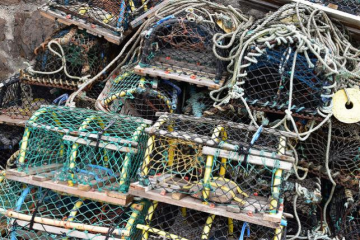 Fiona MacInnes looks at Scotland’s fishing industry and argues that, post-Brexit, the industry is either heading for total corporate domination that will exhaust our resources and impoverish fisherman, or a new collective model where fish are used for the good of Scotland as a whole.,, If the last time you saw a fishing boat was on a Captain Birdseye ad then fish is of more importance to you than just about anything else. It may be the last national asset that you can claim some ownership of. Count up the natural assets that you have lost, and realise why fish is the most important economic and political football of the day. It is the new oil. click here to read the story 10:02
Fiona MacInnes looks at Scotland’s fishing industry and argues that, post-Brexit, the industry is either heading for total corporate domination that will exhaust our resources and impoverish fisherman, or a new collective model where fish are used for the good of Scotland as a whole.,, If the last time you saw a fishing boat was on a Captain Birdseye ad then fish is of more importance to you than just about anything else. It may be the last national asset that you can claim some ownership of. Count up the natural assets that you have lost, and realise why fish is the most important economic and political football of the day. It is the new oil. click here to read the story 10:02
Post-Brexit, north Queensland fishermen consider trade opportunities with the United Kingdom
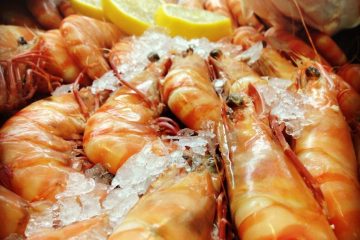 North Queensland fishermen are hoping that now the United Kingdom is to exit the European Union (EU) following the referendum last week, export markets could be re-vitalized. Many stopped exporting to the EU due to difficult protocols and high costs associated with their membership. That was exactly what Mackay Commercial fisherman David Caracciolo did, but he said he may now reconsider that decision if the UK does leave the EU. He believes with the UK split away, it would be much easier to build trade relations. “Previously, the testing regime has been very strict,” Mr Caracciolo said. “We have had lots of incidents in the past where stock, mainly prawns, have been tested in Australian [and] got into the EU and been rejected. “In saying that, the UK — to my knowledge — has not been a big market of Australian seafood but maybe things could change in the future. Read the rest here 08:56
North Queensland fishermen are hoping that now the United Kingdom is to exit the European Union (EU) following the referendum last week, export markets could be re-vitalized. Many stopped exporting to the EU due to difficult protocols and high costs associated with their membership. That was exactly what Mackay Commercial fisherman David Caracciolo did, but he said he may now reconsider that decision if the UK does leave the EU. He believes with the UK split away, it would be much easier to build trade relations. “Previously, the testing regime has been very strict,” Mr Caracciolo said. “We have had lots of incidents in the past where stock, mainly prawns, have been tested in Australian [and] got into the EU and been rejected. “In saying that, the UK — to my knowledge — has not been a big market of Australian seafood but maybe things could change in the future. Read the rest here 08:56






